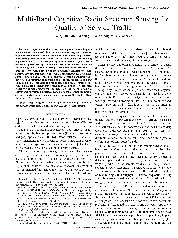摘要
Cognitive radios (CRs) are capable of sensing the RF spectrum to identify idle bands dynamically, and transmit opportunistically so as not to interfere with cohabiting primary users (PUs) over the same bands. In this work, spectrum sensing algorithms for CRs that support quality-of-service (QoS) traffic are investigated. Multiple bands are sensed in parallel to reduce the sensing delay, while ensuring a fixed minimum rate for CR transmissions with a given outage probability. Interference constraints are also imposed to protect PU transmissions. Both fixed sample size (FSS) as well as sequential sensing algorithms are developed to minimize the sensing delay. In the sequential sensing case, a bank of sequential probability ratio tests (SPRTs) are run in parallel to detect PU presence in all bands concurrently. Notably, the parameters for the detectors can be obtained via convex optimization. Numerical tests demonstrate that sequential sensing yields average sensing delays significantly smaller than those of FSS sensing.
- 出版日期2011-10
- 单位西安交通大学
